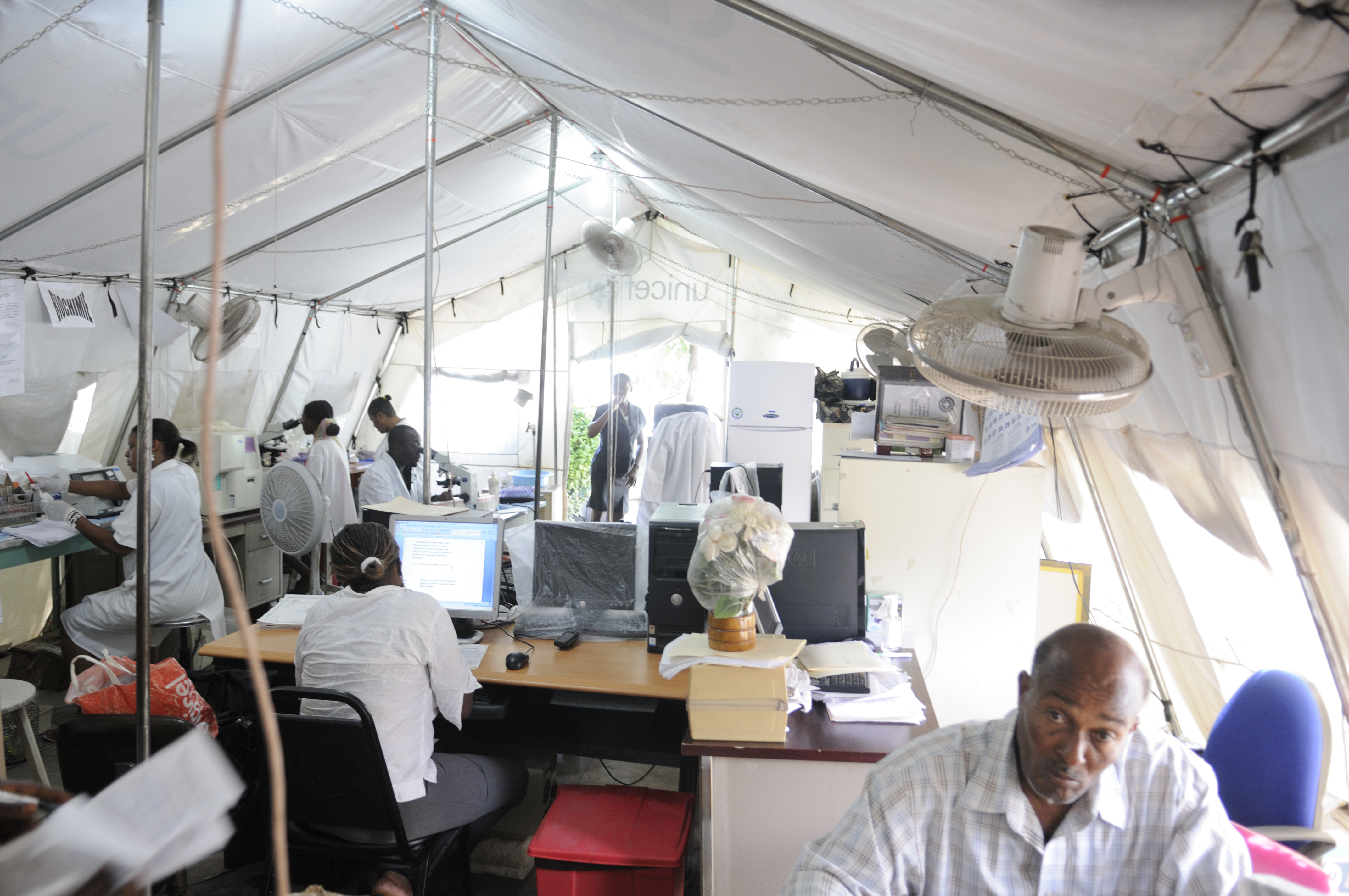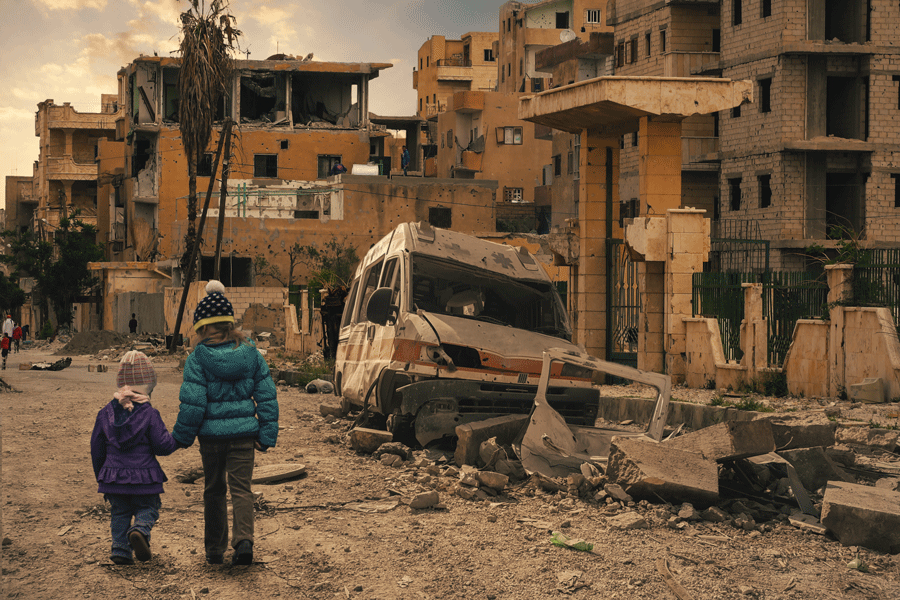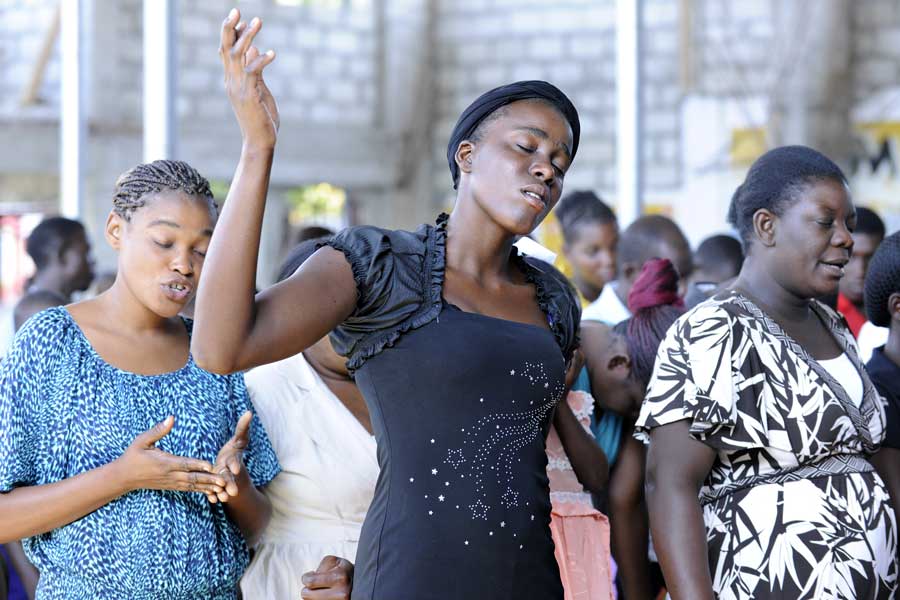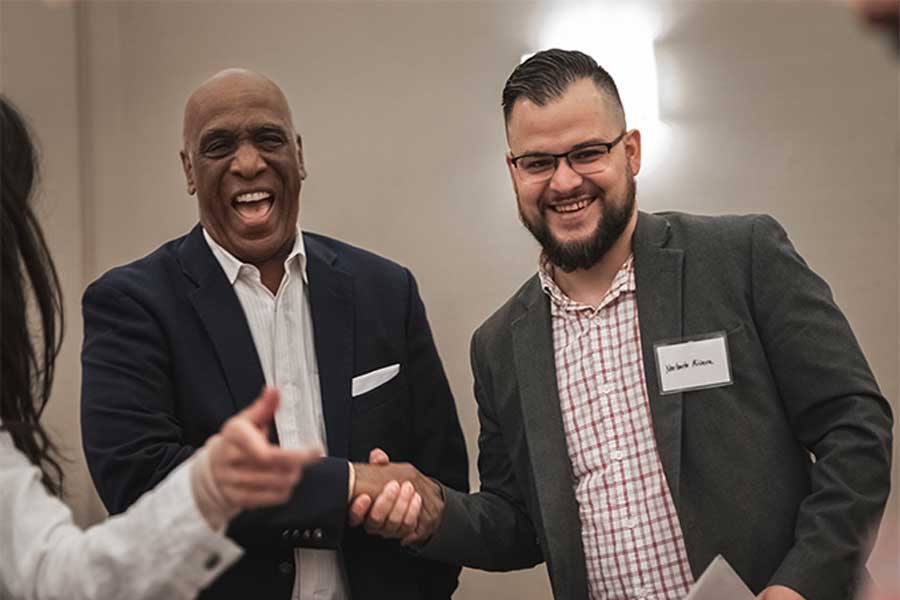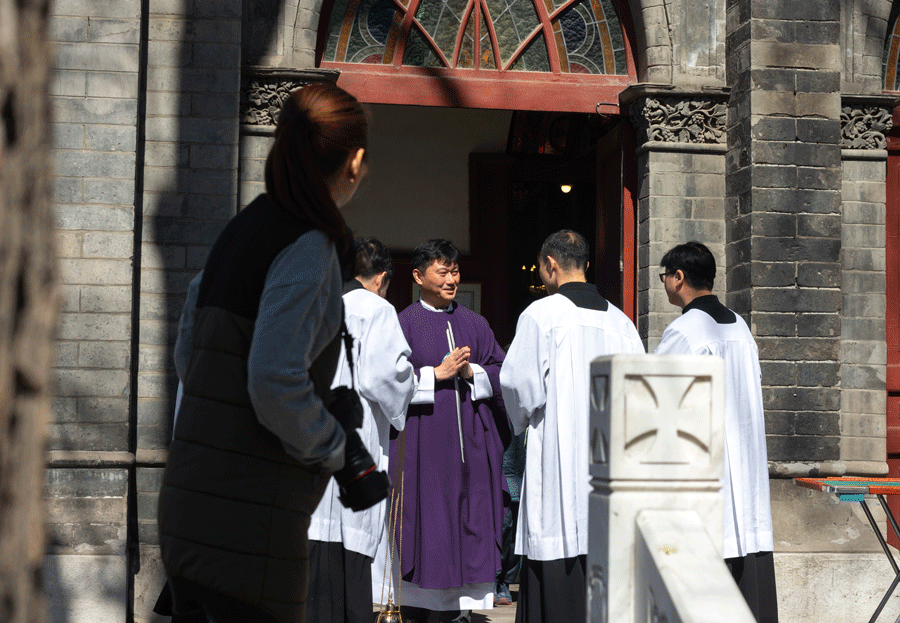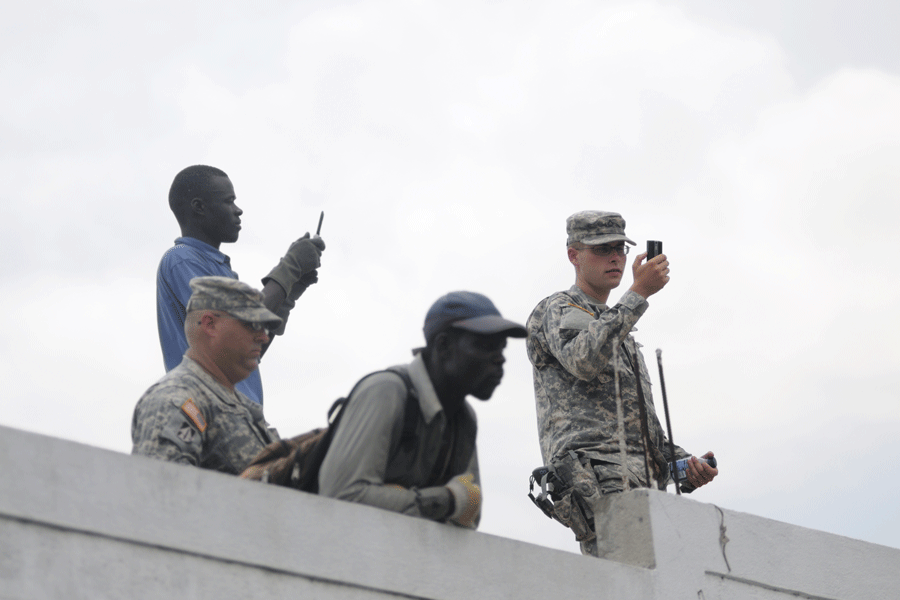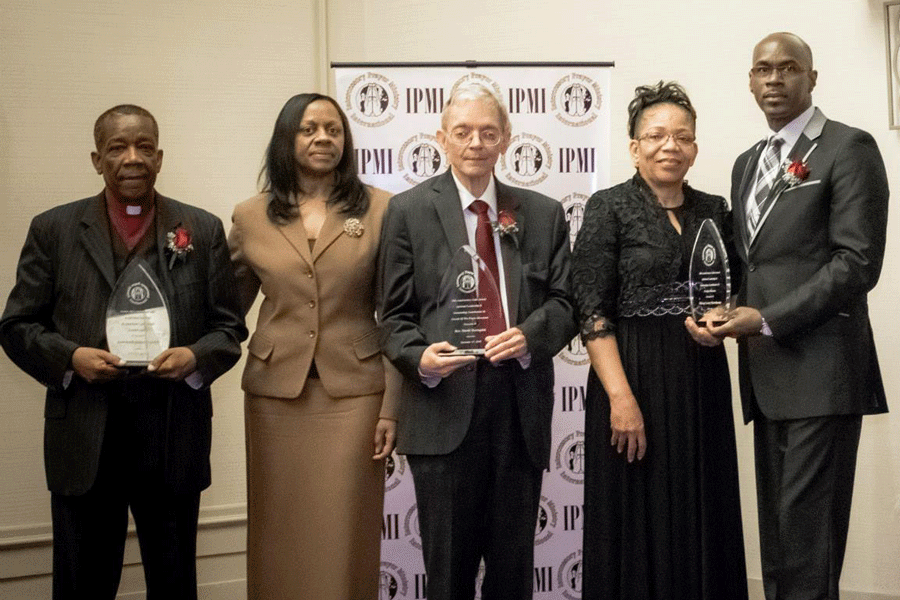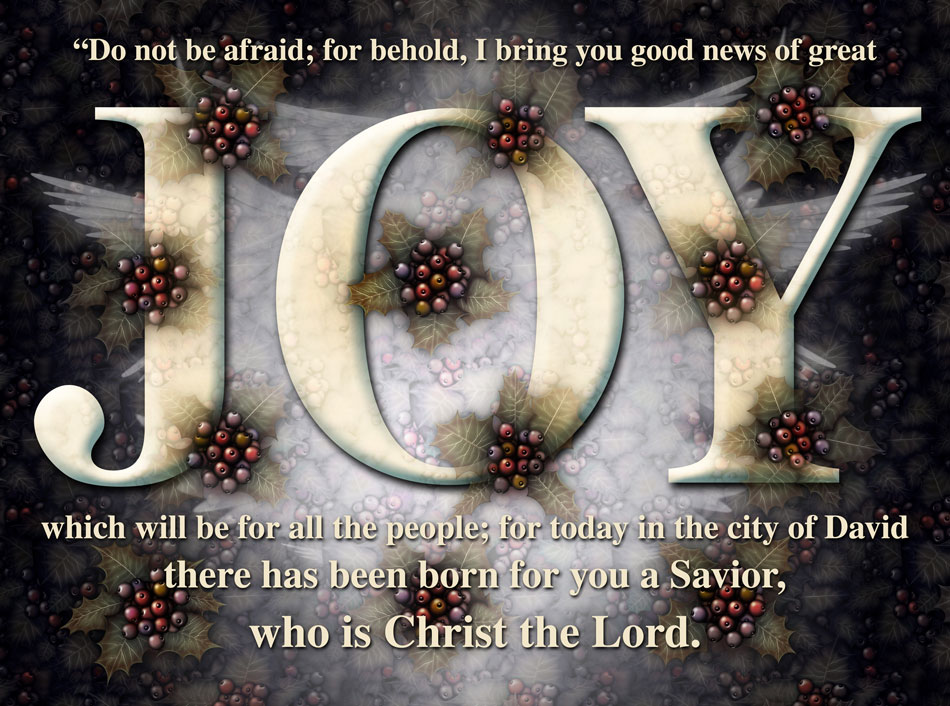Articles
Haiti health system nears collapse as medicine dwindles, gangs attack hospitals
PORT-AU-PRINCE, HAITI —
On a recent morning at a hospital in the heart of gang territory in Haiti's capital, a woman began convulsing before her body went limp as a doctor and two nurses raced to save her.
They stuck electrodes to her chest and flipped on an oxygen machine while keeping their eyes on a computer screen that reflected a dangerously low oxygen level of 84%.
No one knew what was wrong with her.
Even more worrisome, the Doctors Without Borders hospital in the Cite Soleil slum was running low on key medicine to treat convulsions.
"The medication she really needs, we barely have," said Dr. Rachel Lavigne, a physician with the medical aid group.
It's a familiar scene repeated daily at hospitals and clinics across Port-au-Prince, where life-saving medication and equipment is dwindling or altogether absent as brutal gangs tighten their grip on the capital and beyond. They have blocked roads, forced the closure of the main international airport in early March and paralyzed operations at the country's largest seaport, where containers filled with key supplies remain stuck.
"Everything is crashing," Lavigne said.
Haiti's health system has long been fragile, but it's now nearing total collapse after gangs launched coordinated attacks on February 29, targeting critical infrastructure in the capital and beyond.
The violence has forced several medical institutions and dialysis centers to close, including Haiti's largest public hospital. Located in downtown Port-au-Prince, the Hospital of the State University of Haiti was supposed to reopen on April 1 after closing when the attack began, but gangs have infiltrated it.
One of the few institutions still operating is Peace University Hospital, located south of the shuttered airport. From February 29 to April 15, the hospital treated some 200 patients with gunshot wounds, and its beds remain full.
"We urgently need fuel because we operate using generators. Otherwise we run the risk of closing our doors," hospital director Dr. Paul Junior Fontilus said in a statement.
More than 2,500 people were killed or wounded across Haiti from January to March, a more than 50% increase compared with the same period last year, according to a recent U.N. report.
Even if a hospital is open, sometimes there is little or no medical staff because gang violence erupts daily in Port-au-Prince, forcing doctors and nurses to stay at home or turn around if they encounter blocked roads manned by heavily armed men.
The spiraling chaos has left a growing number of patients with cancer, AIDS and other serious illnesses with little to no recourse, with gangs also looting and setting fire to pharmacies in the capital's downtown area.
Doctors Without Borders itself has run out of many medications used to treat diabetes and high blood pressure, and asthma inhalers that help prevent deadly attacks are nowhere to be found in the capital, Lavigne said.
At the Doctors Without Borders hospital, medical staff recently tried to save a boy with a severe asthma attack by giving him oxygen, she said. That didn't work, and neither did another type of medication. Finally, they ended up injecting him with adrenaline, which is used in emergencies to treat anaphylactic shock.
"We improvise and we do our best for the people here," Lavigne said.
People's health is worsening because the daily medication they need for their chronic conditions is not available, warned Doctors Without Borders project coordinator Jacob Burns.
"It becomes acute and then they run out of options," he said. "For certain people, there are very, very few options right now."
Despite the pressing need for medical care, the Doctors Without Borders hospital in Cite Soleil has been forced to cut the number of outpatients it treats daily from 150 to 50, Burns said, though all emergencies are attended to.
Scores of people line up outside the hospital each day and risk being shot by gang members who control the area as they await medical care.
Everyone is allowed to enter the hospital compound, but medical staff set up a triage to determine which 50 people will be seen. Those with less urgent needs are asked to return another day, Burns said.
On Friday morning, 51-year-old Jean Marc Baptiste shuffled into the emergency room with a bloody bandage on his right hand. He said police in an armored vehicle shot him the previous day as he was collecting wood to sell as kindling in an area controlled by gangs.
Once inside, nurses removed the bandage to reveal a gaping wound in his thumb as he cried out in pain. Lavigne told him he needed a plastic surgeon, which the hospital does not have, and ordered X-rays to ensure there was no fracture.
On average, the Cite Soleil hospital sees three wounded people a day, but sometimes it's up to 14 now, staff said.
Recently, five people wounded by bullets arrived at the hospital after spending all night inside a public bus that couldn't move because of heavy gunfire, Burns said.
"Cite Soleil was long the epicenter of violence," he said. "And now violence is so widespread that it's become a problem for everyone."
Transactional Prayer The Hannah Example
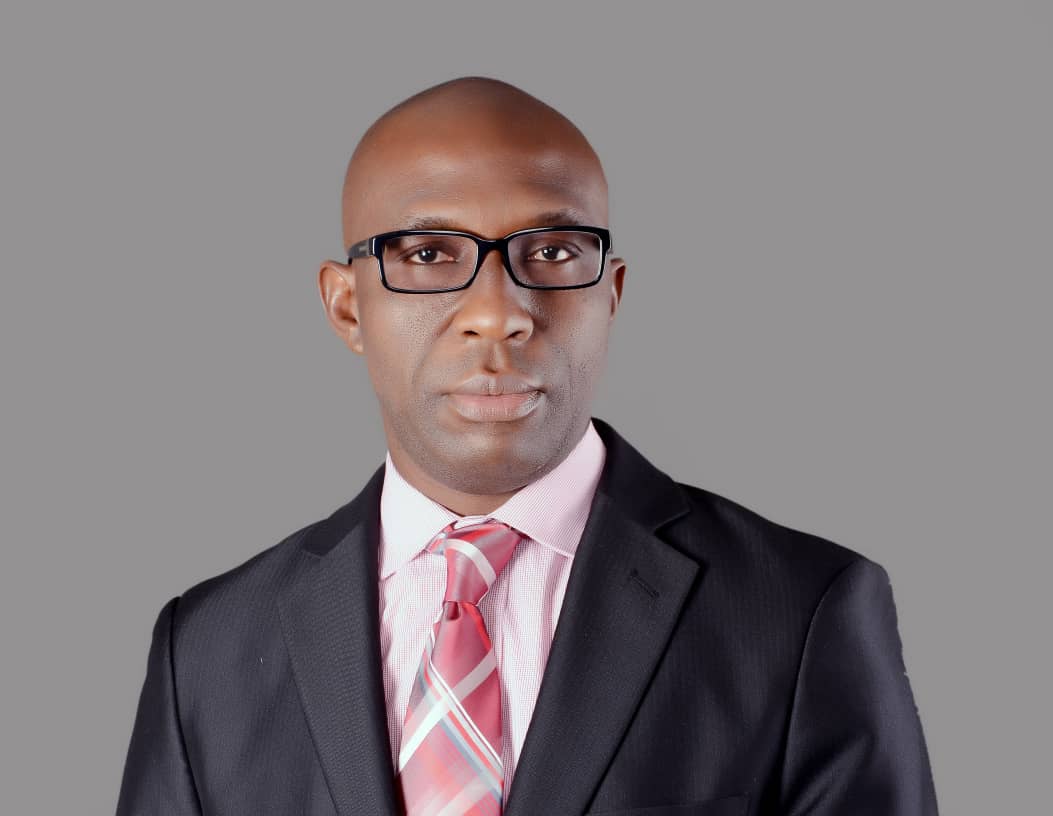 Ebere NwankpaThe transaction under reference here is not the perfunctory everyday kind. Indeed, it is not rooted or grounded in the temporal sphere. Even though it includes and encompasses certain human elements, the ultimate outcome is divine and spiritual. Admittedly, the mere idea of a transaction suggests a minimal and procedural engagement that has little meaning beyond the transaction itself. The earthbound and material nature of many a transaction, the fact that it is mostly about the exchange of things of physical or sentimental value between two or more parties makes it rather unsuited for the fulfillment of spiritual ends, it would seem.
Ebere NwankpaThe transaction under reference here is not the perfunctory everyday kind. Indeed, it is not rooted or grounded in the temporal sphere. Even though it includes and encompasses certain human elements, the ultimate outcome is divine and spiritual. Admittedly, the mere idea of a transaction suggests a minimal and procedural engagement that has little meaning beyond the transaction itself. The earthbound and material nature of many a transaction, the fact that it is mostly about the exchange of things of physical or sentimental value between two or more parties makes it rather unsuited for the fulfillment of spiritual ends, it would seem.
According to Dictionary.com, the contemporary and ordinary meaning of the word ‘transact’ is to carry on or conduct business, negotiations, or activities to a conclusion or settlement. The business and mercantile purchase of the word is strong and prominent. However, the English derivation of the word depicts a commercial bias that was not originally intended. The original Latin word transactus means to ‘carry out’ or ‘accomplish’. The prefix, trans speaks of movement and progression ‘across, beyond, or through’, while the suffix actus is about motivation and direction – ‘to drive, lead’. It is a word that is more than a word. It is a deliberate and emphatic idea of vision, direction, initiative, action, perseverance and accomplishment.
Even so, the particular contextual and atmospheric background of the negotiation we are about to discuss singles it out as epic, seminal, and exemplary. The antecedents of Hannah’s encounter with Yahweh at the tabernacle in Shiloh present us with a surfeit of teachable and instructive moments that amplify the power of prayer and supplication in an uncommon and singular way, with a powerful and availing transaction and negotiation at the center of it. It is my belief and conviction that this is a pattern and template for people of prayer upon whom the hand of the Lord has alighted in election. This discussion might also shed some light on the possible reasons for certain scenarios of frustration, delay or sorrow in the place of prayer.
BARRENNESS?
The heroine and protagonist of this piece is introduced in the second verse of the first chapter of the true and historical book of 1 Samuel. It was not a singular billing. Hannah shared the space and mention with Peninnah. They had similar designations and a relationship in common. They were the two wives of a godly, observant and prosperous gentleman by the name of Elkanah. However, a shared space or relationship is not always a shared destiny as we shall soon apprehend. These two were different in one notable way, Peninnah had children, Hannah had none.
This divergence in childbearing fortunes was not insignificant. Indeed, it was destiny defining. Notably, at first, Hannah was defined by who she was not, and what she did not have. Not only was this so, she was confronted everyday by a close associate, someone who had proximity and contact with her, who had an abundance of the very thing she lacked. Hannah, by contrast to Peninnah was not a mother for the lack of children. If Peninnah was not so front and center, it might have been possible for Hannah to obtain a form of relief from her situation.
Furthermore, Hannah was isolated. She was the odd one out of the three principals in the same family. Observe that the two women were married to the same man. One of them had multiple children, and the other did not. Clearly, both Elkanah and Peninnah were fertile. Hannah was decidedly in the minority, and on the negative extreme of fertility spectrum. Whereas the other two had children in common, Hannah was alone. In an era when childbearing was one of the major measures of womanhood, Hannah’s life must have seemed empty and unfulfilled.
From the foregoing, Hannah’s situation would seem like a straightforward case of barrenness. All the natural indices pointed in that direction. But then, the natural and rational thesis was upended and foreclosed in this case owing to the double referenced clauses in verses five and six of 1 Samuel chapter one – “the Lord had closed her womb”. That half sentence occurs twice in the two verses mentioned above, for certainty and emphasis. Hannah’s childlessness was an act of God. She had a capable womb that was under divine interdiction. She was not barren. Far from it. The hand of the Lord was upon her.
ELECT
God’s intervention in the matter was rather emphatic and deliberate, as referenced above. It was an act of sovereign intervention that suspended the normal biological process of the emergence and flowering of life in the womb. The position God took precluded Hannah’s knowledge or permission. It would appear that Hannah’s womb could not receive seed for the period during which the Lord closed her womb. Some may view this as capricious, intrusive and meddlesome. There may be a rational argument for gainsaying the dealings of God in this particular.
Where such a tendency exists, the rest of the narrative would provide an effective and necessary corrective. As it turns out, there was a grand plan afoot. And, in the course of time Hannah would come to acknowledge and enjoy her part in it. However, that would not be for a time yet. The bias of human expectation is implicated here. Our thoughts regarding God’s interventions overwhelmingly tends to be tied to material advantage, to the exclusion of any discomfort. The intervention in this narrative asserts a different but necessary divine perspective.
Our comfort does not always have the priority that we would prefer where the will of God is concerned. The same can also be said of our need to know, and even our choices and preferences. Think of it this way, God’s sovereignty would be in great jeopardy if our natural disposition is allowed to interfere. It would amount to very little if it was subjected to our finite knowledge or variable preferences. In the meantime, Hannah swam in the tidal wave of her ignorance and frustration.
However, in this bleak and restive condition a powerful and distinctive designation emerged. The reason why God was invested in Hannah’s womb, the rubric under which God intervened in such a decisive and destiny defining manner, was election. Hannah was divinely selected and set apart for a purpose critical to the plan of God for the nation of Israel. Her predicament, isolation and delay was merely the measure of being elect. Divine election is disruptive. It sets one apart from others in very consequential, public and uncomfortable ways. Even so, there is no clear indication in the narrative that Hannah knew or understood her election for many a year. Election can be a mystery to the elect, for a time.
PROVOCATION
The antagonism animating Hannah’s situation went beyond discomfort. It wore a more active and malevolent aspect. It was virulent and consistent. Peninnah was vocal, expressive and abusive. It was quite clearly a massive provocation and oppression. Far from being sympathetic, accommodating or polite, Peninnah went out of her way to make Hannah’s life miserable. She took every opportunity to remind Hannah of her predicament. She was unrelenting, calculating and piercing. Weirdly, it would seem that Peninnah derived more malicious enjoyment from tormenting Hannah than she did from having children. As a matter for contemplation, and situational awareness, this kind of election can expose one to ridicule and embarrassment.
It is unclear why Hannah was, and remained especially vulnerable to Peninnah’s constant attacks. One would have thought that with time and experience, Hannah would have developed some coping mechanisms, or evolved a tougher skin to deal with the taunts. Perhaps, Hannah’s problem was deeper than her abject vulnerability. Her ignorance was a more fundamental and injurious issue. If she had been able to apprehend the hand of the Lord upon her, and the fact that what was at stake was bigger than her existential circumstances, her disposition might have been rather different.
Dear readers, persistent provocation of this sort requires spiritual enquiry. If you are in this or a similar situation, consider taking time out to enquire of God. In a situation where ignorance was a vulnerability, Hannah was essentially defenseless. Conversely, knowledge and revelation can be a viable defense against provocation and ridicule. Where provocation persists, the associated misery can drive one inside oneself and away from the answers one desperately needs. Don’t let this be you.
Peninnah was not the only actor in this turbulent and toxic scene. Elkanah, Hannah’s husband loved her and sought to ameliorate her embarrassment and distract her. He did so with limited success. Elkanah’s piety and prosperity made it possible for the entire family to make the yearly pilgrimage to Shiloh. Spiritually and strategically, these yearly trips presented Hannah, at least potentially, with an opportunity to enquire of God regarding that situation. However, the negative and malicious impetus of provocation was also at work at the very same time. Curious.
Verse 7 of 1 Samuel chapter one reveals that the provocation was well timed to coincide with when Hannah went up to the house of the Lord. The timing here is key. It functioned as a drag on Hannah’s spiritual health and made her less spiritually aware, perceptive or engaged as she should have been. Her spiritual sensitivity was effectively short circuited and disengaged by the emotional turmoil arising from the provocation. Heightened negative emotionality and spiritual perception seem to be at odds with each other. Whereas, ignorance and vulnerability make great bedfellows. This happened year by year. While ignorance may cause delay, enquiry and revelation may save time. May we not delay enquiry to indulge our emotions.
TRANSACTION
It is unclear exactly for how long the preceding situation persisted. Blessedly, it did not last forever. At some point Hannah realized her problem did not reside in the provocation of Peninnah, nor did a solution lie in the bosom of her loving husband. Indeed, the issue had little to do with human agency or involvement. It was a matter of divine intervention, therefore, proper recourse was to God. Whatever the origin, provenance and pendency of a matter, recourse is always to God. She arose after having a meal and went into the temple. A proper alignment and focus is a critical antecedent of this kind of transaction.
Even at this advanced stage of resolve and divine engagement, Hannah was still emotionally challenged. Descriptions of her state of mind across several biblical translations run the gamut from greatly distressed, and anguished, to, distressed of soul, bitter, and weeping inconsolably. God can handle any range and depth of emotions. Bringing our emotions to God beats indulging them alone. In fact, emotions might have spiritual value if they necessitate, and or precede divine engagement. Despite the powerful emotions on display, Hannah’s prayer is remarkable for several reasons.
She was direct, straightforward and simple. She asked God to remember her and look upon her affliction favourably. Prayer is communication and fellowship with our loving heavenly father. Our afflictions and troubles are legitimate fodder for prayer. However, prayer would not be very effective if it is only, or mostly about how we feel. Hannah quickly transitioned from her affliction and hit the high point of negotiation and transaction. She was specific and deliberate. She asked God for a son, and pledged to give him back to God as a permanent Nazirite.
For someone desperate for offspring, this was a pretty steep price to pay. However, it appears that as Hannah prayed, or perhaps as she prepared to go to the temple, she became aware of the spiritual and prophetic intelligence that was key to her matter. Her promise and undertaking before God went right to the heart and bottom of the matter. Transaction and negotiation with God is unlikely to be a long drawn out affair, once critical revelation is obtained. God wanted the first fruit of Hannah’s womb. Once Hannah acquiesced, the deal was sealed.
The key role of revelation here cannot be overemphasized, or frankly, downplayed. The knowledge of God’s interest in the matter brought about a quick resolution in Hannah’s case. Merely praying to be gifted a child is unlikely to have worked in this case. In other words, if Hannah’s prayer had consisted only of what she wanted, it would not have been effective in the circumstance. A transaction with God cannot be primarily about our need. God’s interest, as obtained through revelation must be reflected. This is the essence and highpoint of a transactional prayer. It takes a fair measure of selflessness and sacrifice to get there.
IMPARTATION
Once Hannah hit that highpoint, there was a reaction. However, before we get to that, let us set the scene. The travails of Hannah occurred during the tenure of Eli, the high priest. His two sons, Hophni and Phinehas, were principal priests in the tabernacle. Eli was a lax and indolent father. His sons were degenerates who profaned the sacrifices made to the Lord and committed sexual immorality with the women who served at the entrance to the tabernacle. Among the many observations God made about Eli and was he honoured his sons more than God, and that they fattened themselves with the choicest part of every offering of the Israelites, as depicted in 1 Samuel chapter two, verse twenty-nine.
As a result of the laxity of Eli, and the profanity of his sons, the reverent and holy atmosphere of the tabernacle was polluted and comprised. This pervasive state of affairs must have had consequences for the quality of worship and prayer obtainable in that sanctuary. It was not a conducive environment for qualitative engagement with God. Eli himself was old, and apathetic to the moral and spiritual decay generated by his sons. By this point in time, his eyes were growing dim. By inference, his spiritual sight was similarly impaired. This was the dire state of the priesthood, and of the tabernacle that Hannah had come to.
But then, Hannah’s dealings with God had reached such a critical point that the divine engagement she had tapped into temporarily changed the atmospheric conditions of the tabernacle, and woke Eli from spiritual torpor. Thus, Eli observed Hannah moving her lips and praying inaudibly, and thought she was drunk. Eli’s misapprehension speaks volumes. Even so, Eli, as the anointed high priest still had the God-given power of impartation and blessing, despite his derelict spiritual condition. Apparently, a deficient and lapsed spiritual state did not make Eli entirely irrelevant. He still held down an important role in God’s economy.
When Hannah clued him in, Eli, now in the full power of office, pronounced a blessing and benediction. His words were well judged and effective. First, he said, “go in peace”. Going by the emotional turbulence and storms afflicting Hannah, this was the first order of business. She needed a divine and calming infusion of peace and tranquility to quiet the storms within. Even God’s blessing and intervention requires peace to be effective. Second, he affirmed that the God of Israel will grant her petition. The effect of Eli’s words on Hannah was immediate. She left the tabernacle no longer sad, or troubled. The transaction had been concluded successfully.
VISITATION
Almost as if that transaction was what the family was waiting for, the next morning, they worshipped before the Lord, and returned home, traveling twenty-four kilometers west to Ramah. I have a premonition that from that time on, Peninnah’s jibes and provocation did not have the desired effect anymore. Hannah emerged from that transaction in God’s presence a stronger and more confident person. Her vulnerability to provocation and psychological triggers dissolved in God’s presence.
When they got home, Hannah and Elkanah resumed normal service, and God remembered her. She conceived and gave birth to a son. She named him Samuel, saying “because I asked for him from the Lord”. Hannah was now a mother. The reproach of childlessness had been lifted after many years of frustration. However, for Hannah, motherhood was way more than a natural phenomenon, or a social event. It had become a prophetic endeavor. Soon, the whole of Israel, and the world, would realize the sheer scope and gravity of Hannah’s travail and transaction.
Meanwhile, Hannah busied herself with nursing and weaning Samuel in preparation for his presentation at the tabernacle. She was focused and conscientious, declining to make the annual pilgrimage until Samuel was weaned and could be taken to Shiloh. When Samuel was weaned, Hannah took the young Samuel together with a three-year-old bull, an ephah of flour and a leather bottle of wine to the tabernacle in Shiloh. She was well prepared and spared no expense in her presentation. God had rightly reckoned that Hannah was the kind of person who kept her promises, even if it cost her dearly.
TRANSFORMATION
Then Hannah lifted up her voice, and prayed in exaltation and ecstasy. She proclaimed “My heart rejoices in the LORD; my horn is exalted in the LORD. I smile at my enemies, because I rejoice in Your salvation”. She exclaimed further, “The LORD makes poor and makes rich; He brings low and lifts up. He raises the poor from the dust and lifts the beggar from the ash heap, to set them among princes and make them inherit the throne of glory. For the pillars of the earth are the LORD’s, and He has set the world upon them” – 1 Samuel 2:1, 7-8.
Recall, dear reader, the Hannah who came into the tabernacle only a few years before, a psychological and emotional wreck. Recall too the antecedents of vexation, frustration and provocation that she endured year after year during the yearly family pilgrimage. Recall also the desperation, tenor and content of her prayers at the time. Compare this to the Hannah that stood praying with confidence and enthusiasm, now. Hannah had undergone a complete and utter transformation.
She was eloquent, expressive, and bold. She had developed an impressive range and capacity for prayer. She was emotional too. Full of irrepressible joy and gladness. She prayed from a place of depth and cognate experience. Her knowledge of God had grown geometrically. It was more than a prayer. It was a song of hope, triumph and accomplishment. An ode of heartfelt thanksgiving and gratitude to God. It was also a warning to the proud and arrogant that God is able to humble them expeditiously. The same woman who was defined by her vulnerability could now smile at her enemies.
In subsequent years, when Hannah and Elkanah went to the tabernacle for the yearly sacrifice, Eli would bless them and proclaim that the Lord should give them more children. The Lord visited and blessed Hannah accordingly. She conceived and gave birth to three sons and two daughters for a total of six children, Samuel included. The hitherto childless woman was now a mother of six. Glory. It was a new season. Cumulatively, Hannah’s life can be divided into three distinct seasons. The first, a season of childlessness and provocation. The second, a season of remembrance and visitation, and the third, a season of transformation and multiplication.
This is how reality changes. If you encountered Hannah in her season of transformation and multiplication, when her children were running around her screaming “mummy, mummy”, it would take some doing to convince you that this was the same woman who endured years of childlessness and intense frustration, in her first season. Seasons change, and reality with it.
Consider a prayerful transaction with God today.
About The Author
Ebere graduated from the University of Ghana with a Bachelor’s Degree in Law and English. He also has a Master's Degree in Public Administration from Regent University in the United States. He has more than twenty years of experience in governance, legal, and administrative matters in the public, private, and non-profit sectors. He was a former Special Assistant to the President of Nigeria on Council and Legal Matters during His Excellency Goodluck Ebele Jonathan's presidency.
Ebere Nwankpa is a pastor, administrator, and businessman with a concerted and abiding interest in God’s prophetic counsel for Nigeria, Africa, and the world's nations. He is a member of Intercessors for Nigeria (IFN), and Intercessors for Africa (IFA). His books include Joseph - Prince of Egypt and Esther - Queen In Deed.
Email comments or feedback to This email address is being protected from spambots. You need JavaScript enabled to view it.
Netanyahu: Israel ‘one step away’ from winning war with Hamas
Six months into Israel’s war with Hamas, Israeli Prime Minister Benjamin Netanyahu declared Sunday that it is near victory as the country pulled troops out of southern Gaza while maintaining a “significant force” elsewhere in Gaza.
"We are one step away from victory,” he told his Cabinet. “But the price we paid is painful and heartbreaking."
Even as stalled cease-fire negotiations resume in Cairo, Netanyahu pledged, "There will be no cease-fire without the return of hostages. It just won't happen."
Hamas is believed to still be holding about 100 hostages in Gaza tunnels, among the 250 or so it captured in its shock October 7 attack on Israel that killed 1,200 people. As of mid-February, 112 hostages have been freed, most during a week-long cease-fire in November, while 36 more are believed to have died or been killed in Gaza during the six months of fighting.
Gaza’s Hamas-run health ministry says Israel’s counter-offensive has killed more than 33,000 people, two-thirds of them women and children. The Israeli military says that the total includes thousands of militants it has killed.
With the carnage mounting, Tedros Adhanom Ghebreyesus, director-general of the World Health Organization, appealed for an end to the war.
He acknowledged the “barbaric act” of the initial Hamas attack but said, “This atrocity does not justify the horrific ongoing bombardment, siege and health system demolition by Israel in Gaza, killing, injuring and starving hundreds of thousands of civilians, including aid workers.”
“The deaths and grievous injuries of thousands of children in Gaza will remain a stain on all of humanity,” he said on the X media platform. “This assault on present and future generations must end.”
Netanyahu said that despite growing international pressure, including from its chief ally, the United States, Israel would not give in to "extreme" demands from Gaza's Islamist rulers, Hamas, that it pull all its troops from the narrow territory along the Mediterranean Sea.
In response to a demand last week from U.S. President Joe Biden, Israel agreed to open a new humanitarian aid roadway at Erez at the northern Gaza border with Israel, but operations there have yet to start. Hundreds of thousands of Palestinians are famished, with many sheltering in makeshift tents near Rafah at the Egyptian border in southern Gaza.
Netanyahu has vowed to launch a ground offensive on Rafah to destroy four Hamas battalions, while safeguarding more than a million Palestinian civilians sheltering there. But Israel has made no public statement on where it would move the Palestinians to keep them out of harm’s way.
The U.S. and other Western supporters of Israel have expressed their opposition to any ground offensive at Rafah, fearing that civilians would be caught in the crossfire between Israel and the militants.
Israel on Sunday pulled troops out of southern Gaza, including from the city of Khan Younis, the Israel Defense Forces and Israeli media said, after months of fierce fighting with Hamas militants left much of the area’s infrastructure leveled.
“The 98th commando division has concluded its mission in Khan Younis," the army said in a statement. "The division left the Gaza Strip in order to recuperate and prepare for future operations.
"A significant force led by the 162nd division and the Nahal brigade continues to operate in the Gaza Strip and will preserve the IDF's freedom of action and its ability to conduct precise intelligence-based operations," the statement said.
White House national security spokesman John Kirby told ABC’s “This Week” show that Israel's partial withdrawal from southern Gaza is likely so its troops can "rest and refit," rather than a move toward a new operation.
"They've been on the ground for four months, the word we're getting is they're tired, they need to be refit," Kirby said, though he stressed that it was "hard to know exactly what this tells us right now."
The Israeli newspaper Haaretz said the withdrawal was tactical.
An army official told the left-leaning daily, "There's no need for us to remain in the sector without an [operational] need."
Attack on aid workers
World Central Kitchen founder Jose Andres renewed his call Sunday for an independent investigation into the Israeli airstrike that killed seven of his group’s aid workers last week. Israel has called the attack a “tragic mistake,” while dismissing two officers responsible for the strike and reprimanding others.
In an interview on ABC, Andres thanked Israel for a quick investigation but added, “At the same time, I would say with something so complicated, the investigation should be much more deeper. And I would say that the perpetrator cannot be investigating himself."
He said that Israel was targeting anything that "seems" to move and has been doing so "for too long."
"This doesn't seem like a war against terror. This doesn't seem any more like a war about defending Israel," he said. "It really, at this point, seems like a war against humanity itself."
Kirby said, "There’s going to have to be some changes to the way the Israeli Defense Forces are prosecuting these operations in Gaza, to make sure that [the attack on aid workers] doesn't happen again.”
Cease-fire talks
Negotiators began arriving in Cairo on Saturday for renewed negotiations for a cease-fire and the release of hostages.
U.S. CIA Director William Burns arrived Saturday. Qatari Foreign Minister Sheikh Mohammed bin Abdulrahman al-Thani and an Israeli delegation were expected to take part in the talks as well, Egypt's Al Qahera news reported.
Hamas said in a statement that it is sending its deputy chief in Gaza, Khalil Al-Hayya. It also reiterated its core demands: a complete cease-fire in Gaza and the withdrawal of Israeli forces.
Biden wrote letters to Egyptian President Abdel Fattah el-Sissi and the emir of Qatar, Sheikh Tamim bin Hamad al-Thani, on the state of the hostage talks, and "he urged them to secure commitments from Hamas to agree and abide by a deal."
Kirby said last week Biden also told Netanyahu to empower his negotiators in Cairo to agree on a cease-fire deal as soon as possible, while allowing more humanitarian aid into Gaza.
Some information for this report was provided by Reuters, The Associated Press and Agence France-Presse.
UN: Haiti Gangs Kill 1,500 in Three Months
Gang violence has killed more than 1,500 people in Haiti so far this year, the United Nations said Thursday, as it deplored the continuing stream of weapons pouring into the Caribbean Island nation.
The U.N. described the situation in the chaos-wracked country as "cataclysmic."
"It is shocking that despite the horrific situation on the ground, arms keep still pouring in,” Volker Türk, the U.N. high commissioner for human rights, said in a statement. “I appeal for a more effective implementation of the arms embargo."
The U.N. said dozens of people have been lynched by so-called self-defense brigades this year. Many of the gang members are convicted criminals, 4,000 of whom have escaped from Haiti’s two biggest prisons.
"All these practices are outrageous and must stop at once," Türk said.
The U.N. said the gang wars have intensified in recent weeks as heavily armed rivals have engaged in new waves of attacks, including raids on police stations and the international airport.
Prime Minister Ariel Henry announced his resignation on March 11. He left Haiti and now is in the U.S. territory of Puerto Rico, with the gangs preventing his return to Haiti.
A transitional presidential council that will be responsible for selecting a new prime minister issued its first official statement on Wednesday, pledging to restore “public and democratic order” in Haiti.
“We are determined to alleviate the suffering of the Haitian people, trapped for too long between bad governance, multifaceted violence and disregard for their perspectives and needs,” the council said.
The council members said that as soon as they are officially installed, they would help “put Haiti back on the path of democratic legitimacy, stability and dignity.”
The U.N. report documented 4,451 killings last year and 1,554 through March 22 of this year. The U.N. said some of the killings have occurred in residents' homes due to civilians' alleged support for the police or rival gangs, or in densely populated streets due to crossfire or snipers. One victim was a three-month-old baby.
In addition, the U.N. rights office said that with lax security in Haiti, 528 people suspected of links to gangs were lynched by armed brigades last year and 59 more this year.
Some material in this report came from Agence France-Presse, Reuters and The Associated Press.
Meet the May 11, 2024, 15th Annual Pastors and Leaders Prayer Symposium Speaker: Rev. Dr. Charles Galbreath
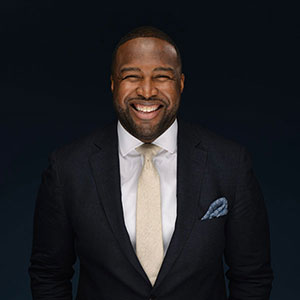 Rev. Dr. Charles GalbreathThe Rev. Dr. Charles O. Galbreath is the Senior Pastor of Alliance Tabernacle Church in Brooklyn, New York, and Assistant Professor of Ministry at Asbury Theological Seminary in Wilmore, Kentucky. Before his current role, Dr. Galbreath was the Associate Dean, Director of Field Education, and Partnering Professor at Alliance Theological Seminary in New York City. He was elected to the Board of Directors for the Christian and Missionary Alliance denomination in 2017.
Rev. Dr. Charles GalbreathThe Rev. Dr. Charles O. Galbreath is the Senior Pastor of Alliance Tabernacle Church in Brooklyn, New York, and Assistant Professor of Ministry at Asbury Theological Seminary in Wilmore, Kentucky. Before his current role, Dr. Galbreath was the Associate Dean, Director of Field Education, and Partnering Professor at Alliance Theological Seminary in New York City. He was elected to the Board of Directors for the Christian and Missionary Alliance denomination in 2017.
Dr. Galbreath is an active member of several organizations, including Brooklyn Community Board 17, the SUNY Downstate Medical Center’s Community Advisory Board, the Clergy Advisory Council of the Fire Department of the City of New York, The Center for Community Alternatives, and the 67th Precinct Clergy Council (The Godsquad), where he serves as treasurer. In 2022, Dr. Galbreath was recognized by the magazine “City and State” as one of the Faith Power 100, New York’s most influential religious leaders. He has also served as a member of the New York City Mayor’s Sector Advisory Council for COVID-19, the District Executive Committee for the Metropolitan District of the C&MA, Co-Chair of the 45th Council District Committee in Brooklyn, NY, and as Vice President of the Association of African American Churches of the C&MA.
Dr. Galbreath graduated magna cum laude from Nyack College with an undergraduate degree. He holds an M.Div. from Alliance Theological Seminary and a Th.M. from Princeton Theological Seminary. In 2020, he earned his Ph.D. from Fordham University’s Graduate School of Religion and Religious Education. Dr. Galbreath has also received several awards throughout his career, including the Young Alumnus of the Year Award at Nyack College in 2011, induction into the Honor Society of Phi Kappa Phi at Fordham University in 2017, and the Alumnus of the Year Award from Alliance Theological Seminary in 2020.
Dr. Galbreath's journey has led him through various church experiences, from Baptist and Pentecostal traditions to mainline and Evangelical churches. He has served in Maryland, Pennsylvania, Harlem, Queens, and Brooklyn, New York ministries.
Dr. Galbreath is married to Flobien Vidal Galbreath, his college sweetheart. They have three children together: Charles Oliver Galbreath, Jr. (C.J.), Malia Marie Galbreath, and Grayson Alexander Galbreath, and they are proud parents.
The 15th Annual Pastors and Leaders Prayer Symposium will be hosted on Saturday, May 11th, 2024, from 9:00 am to 12:30 pm EDT, at the LaGuardia Plaza Hotel, 104-04 Ditmars Blvd., East Elmhurst, NY 11369. Dr. Galbreath will speak on Serving in Truth, Justice, and Integrity: How do we proclaim and model these spiritual values in our ministries?
Participants can attend the Symposium in person or online. Register now. You cannot afford to miss this significant leadership event.
Take Action
Register Now to join us in person for the 15th Annual Pastors and Leaders Prayer Symposium
Register Now to join us Online for the 15th Annual Pastors and Leaders Prayer Symposium
Make a Donation to assist with the hosting cost of the Symposium
Chinese Pastor Released After 7 Years in Prison, Unable to Get ID
BEIJING —
Unable to buy a train ticket, or even see a doctor at a hospital, a Chinese pastor found that his even after release from prison, he is not quite free.
The Rev. John Sanqiang Cao was arrested and sentenced to seven years in prison while coming back from a missionary trip in Myanmar. Now back in his hometown of Changsha in southern Hunan province, he is without any legal documentation in his country, unable to access even the most basic services without Chinese identification.
"I told them I'm a second-(class) Chinese citizen, I cannot do this, I cannot do that," Cao in an interview with The Associated Press. "I'm released, I'm a free citizen, why should there be so many restrictions upon me?"
Cao, who was born and raised in Changsha, had dedicated his life to spreading Christianity in China, where the religion is strictly regulated. He had studied in the U.S., married an American woman and started a family, but said he felt a calling to go back to his home country and spread the faith.
It's a risky mission. Christianity in China is allowed only in state-sponsored churches, where the ruling Communist Party decides how Scripture should be interpreted. Anything else, including clandestine "house" churches and unofficial Bible schools, is considered illegal, though it was once tolerated by local officials.
Cao was undeterred, citing the courage of Chinese Christians he had met who spent time in prison for their faith. During his years in China, he said he had set up some 50 Bible study schools across the country.
In the years leading up to his arrest, he had started bringing Chinese missionaries to parts of northern Myanmar that had been impacted by the country's civil war. They focused on relief work, campaigning against drug use, and setting up schools in areas bordering China.
It was in coming back from one of these crossings that he was detained in 2017. He was sentenced to seven years on a charge of "organizing others to illegally cross the border," which is usually reserved for human traffickers.
His family and supporters advocated for Cao's sentence to be reduced, but to no avail. Cao was a prisoner of conscience, according to the federal U.S. Commission on International Religious Freedom, which also called for his freedom.
After completing his sentence, Cao is no longer behind bars. But he is facing another major obstacle.
He said that police who came to his mother's house in 2006 took away her "hukou" registration book, which had also included Cao.
Every child born in China is registered in the hukou, which is an identification system through which social benefits are allocated by geography. Later in life, the hukou is needed to apply for a national ID card, which is used in everything from getting a phone number to public health insurance.
According to Cao, police said they would help his mother update the hukou. It was only later that he found out in updating her registration that they removed his name.
Cao never took American citizenship because of his calling, spending his time between the two countries. He had kept his U.S. permanent residency throughout this time, though he says that's not accepted as an ID in China.
He was traveling on his Chinese passport. Though he noted that he no longer had the hukou registration, he did not realize how serious the problem was until much later.
In prison, his Chinese passport had expired, he said, and he could not renew it.
Cao said he has been to the police station many times since his release and had even hired a lawyer. So far, he said police had not given him a satisfactory answer as to why his records no longer exist.
A police officer at the Dingwangtai police station in Changsha, where Cao's hukou registration is supposed to be, said he did not know how to address Cao's claims. "Even if he went to prison, he should still have a hukou," he told the AP. The officer refused to give his name because he wasn't authorized to talk to the media.
Cao's two adult sons were able to visit him this month, spending two weeks with their father. Cao said he wants to join them and his wife in the U.S., though it's unclear how he can do that.
"I moved from a smaller prison ... to come to a bigger prison," he said.
Intercession and Family Dynamics The Judah Perspective
 Ebere NwankpaThe popular perception of intercession as an overly spiritual activity, restricted to incessant and rigorous prayer with bouts of fasting, by fiery and pious Christian types is rather overwrought and limited. To be sure, the prayer and fasting avails much, and the dedicated and wonderful people who excel therein are critical to the advancement of the kingdom. However, the scope and ambit of intercession is larger and more dynamic, as we shall soon see, than the popular or traditional perception of it. Moreover, this dimension of intercession is a much needed help and companion to its more acknowledged forms. The discussion presented below is drawn from the authoritative account in Genesis chapters twenty-nine and thirty, and thirty-seven to forty-five.
Ebere NwankpaThe popular perception of intercession as an overly spiritual activity, restricted to incessant and rigorous prayer with bouts of fasting, by fiery and pious Christian types is rather overwrought and limited. To be sure, the prayer and fasting avails much, and the dedicated and wonderful people who excel therein are critical to the advancement of the kingdom. However, the scope and ambit of intercession is larger and more dynamic, as we shall soon see, than the popular or traditional perception of it. Moreover, this dimension of intercession is a much needed help and companion to its more acknowledged forms. The discussion presented below is drawn from the authoritative account in Genesis chapters twenty-nine and thirty, and thirty-seven to forty-five.
The Judah narrative reveals certain practical dynamics of the deployment of intercession that are as accessible as they are instructive. The dysfunctional family dynamics upon which the matter is resolved makes it even more relatable. The dimension of intercession at play here is rooted in human relations with its passions, errors, feuds, greed, resentment, deceit, and wickedness. There is also a greater expression of courage, sacrifice, forgiveness and redemption. This is intercession at the grassroots and family level. I believe that there is a revival of intercession at the level of interpersonal and family relations in order for prophetic destinies to be secured and fulfilled. The thoughts advanced here, is a contribution to that.
Notably, there were a clutch of serious and weighty issues preceding the seminal exercise of intercession under consideration, that were at least potentially disqualifying and most certainly constraining. The history and circumstances preceding Judah’s finest hour made him an unlikely source of such grace and skill. His personal history should have put him down for the count, and invalidated any credibility, standing, or stature on his part. And yet, he transcended all that to be highly effective and compelling. It suggests that perhaps the best intercessors are those who have overcome significant obstacles and limitations. People with a past and a story to tell. Persons who understand from a personal, subjective and intimate viewpoint; the feeling and depredations attaching to situations of loss and disadvantage.
Family
At the center of the constraining factors earlier alluded to was the peculiar disposition of the Jacob family. The family orientation was defined by several strong and torrential currents that crisscrossed and interacted with each other to produce a tangled brew of friction, animosity and faction. These cross currents had complex generational and intergenerational layers. At the top and origin of this dysfunction was Jacob’s marriage to two sisters and his pronounced and abiding preferential love for the younger Rachel, over her older sister, Leah. To be fair to Jacob, the situation was not entirely of his own making. The deceit sponsored by Laban, his father-in-law was a fundamental and contributory factor.
However, Jacob’s unconstrained and enduring partiality created a ferocious rivalry between his two wives particularly in the area of child bearing, with dire consequences. As this rivalry intensified, Rachel and Leah involved their respective maids, Bilhah and Zilpah as childbearing surrogates and allies in their sibling dispute. By the time the women began to name their sons triumphalist appellations, often referencing the dispute, the dysfunction entered the succeeding generation. Rachel’s obsession with childbearing, a matter for which she reproached her beloved husband and envied her sister, may have contributed to her death in childbearing, even though the narrative does not clearly state this.
Jacob intensified matters by transferring the love he bore Rachel to her sons Joseph and Benjamin, in the same preferential and exclusionary proportion, relative to his other ten sons. The open favouritism traversing two generations poisoned the atmosphere and stifled any notion of brotherliness. Arguably, the possibility of normal family relations was effectively marginalized by Jacob’s deficient fatherly disposition and preferences. As if this was not enough, Joseph, the foremost and most celebrated object and beneficiary of this preferential and unearned love extinguished any possibility of goodwill his brothers might have had toward him by bringing a bad report of his brothers to his father.
He also told them, perhaps rather pompously and derogatorily, of his dreams of preeminence and exalted destiny. Admittedly, Joseph’s dreams had genuine prophetic and strategic import. However, the effect of his dismissive and free expression on his bitter and disgruntled brothers made things distinctly worse. It would appear that Joseph was at the very least insensitive to and perhaps, worse, oblivious of the malign state of mind of his brothers. He failed to read the room. It is possible that Joseph could have chosen to moderate and balance his father’s weaknesses, but for reasons of youth and inexperience, was unable or not inclined to. Not needing any further cause to hate him, Joseph's dreams catalyzed and hardened his brothers' loathing of him. If the mood was fraught and chippy hitherto, it was murderous now.
In the most injurious act of hatred and calumny, Joseph’s brothers laid hands on him to kill him. However, they belatedly agreed to sell him into slavery instead, on the canny advice of Judah. Interestingly, Judah counseled his brothers against bloodguilt, and they heeded him. Importantly, at this time, his moral compass and brotherly feeling did not extend to saving Joseph. He shared the loathing and animosity of his brethren. When Joseph’s brothers sold him off, they stripped him of his rightful birthright as a son of his father and of fellowship with them as brothers. Granted, Joseph’s relationship with his brothers was as tenuous as his relationship with his father was tender. Not only that, the tale they told their father to cover up the deed, depicted Joseph as dead. And for all practical purposes Joseph was dead to his brothers by their own act and dead to his father by their report.
History
It may be that many intercessors have pristine and regular personal antecedents. Judah most certainly did not. His past included what may be referred to as an extended period of backsliding that had deleterious and generational consequences. In the very first verse of Genesis chapter thirty-eight, sometime after Joseph was sold into slavery, we are told that Judah made a fateful detour. It was to be a life-defining decision. He left the company and abode of his brothers and moved in with a Canaanite friend, by the name of Hirah, the Adullamite.
It is unclear if the family dysfunction in his primary homestead contributed to his decision to leave. If it did, his decision would be understandable, even if proved to be unwise. Whatever his reasons, they are not disclosed in the narrative. However, the fact that he stepped out alone was a highlight and emphasis of the narrative. In any case, the ancestral thread of family dysfunction followed him to his new locale. In his own case, the phenomenon intensified and proliferated. It is pertinent to pause here to remark that the treatment and solution to ancestral patterns of this sort is possible through deliverance, another dimension of intercession.
In this state of error and compromise, Judah met and married a Canaanite woman and proceeded to have three sons. Judah deepened his Canaanite affiliations by taking a wife for his first son, the famously notorious Tamar, and perhaps the single most controversial character in the lineage of Jesus. In the course of time, Judah’s first and second sons Er, and Onan died by acts of divine judgment. Judah’s fear for the mortality of his third and only surviving son drove him to undertake a policy of deceit and preservation that precipitated Tamar’s spectacular gambit. Judah’s carnal proclivities ensnared him in an incestuous rendezvous that profoundly embarrassed and defined him.
It should be emphasized here that the catastrophic losses Judah suffered, his plaintive attempt to shield his son Shelah from the same fate, as well as the embarrassment arising out his dealings with Tamar had a profound and sobering effect on him. And, as future events would reveal, it contributed to making him an effective and impactful intercessor. His history and life story gave him a level of authenticity and gravitas that matched the occasion and the peculiar circumstances to come.
A rational mind and many of a charitable orientation would readily conclude that there is very little chance of recovery from this sort of sordid history and antecedents. Too many strikes. It would seem that the prospect of restoration or normalcy was just too much to hope for, such was the water under the bridge as the saying goes. But something uniquely and profoundly redemptive was afoot here. Joseph’s brothers would eventually have to revisit, confront, and reckon with their wickedness, under the stern gaze of the Joseph they did not know. And, Judah would play a leading and starring role in it.
Redemption
The turning point came when the cup was found in Benjamin’s sack. His senior brothers had a decision to make. Joseph’s steward had been clear and categorical about the fact that the penalty for the crime would affect only the singular perpetrator and that the others not tainted by guilt were free to go. Furthermore, with the evidence now facing them, the matter of Benjamin’s guilt or innocence was an open question. At the very least, it would appear that Benjamin had complicated matters by reason of what was discovered in his sack. With this complication came other rather unhelpful possibilities, including the disruption of their trip and the threatened welfare of their families in Canaan, who were waiting on the grain. There certainly were pragmatic reasons that could legitimize continuing the trip without Benjamin.
However, in the silence that ensued, the brothers took their first three acts of redemption. They tore their clothes, loaded their donkeys and returned with the steward to Joseph’s house. It is important to contrast the action of the brothers here to the exchange that animated them during their first trip to Egypt, when they were under the pressure of Joseph’s hostile interrogation. At that time, an engaging introspective conversation was had and fingers were pointed. Not to put too much of a fine point on it, that represented real progress at the time. This time however, the first reaction of the brothers was silence. Silence to properly observe and internalize the gravity of the situation. This was the sort of situation in which silence is more eloquent than words. Noticeably, there was no chatter about Benjamin’s culpability, or not.
Second, they all separately and uniformly tore their clothes, an eloquent and unequivocal sign of grief and mourning. Even though only Benjamin was implicated, his brothers did not attempt to extricate or exculpate each other. It was a demonstration of a shared fate. They all in unison and without breaking ranks took responsibility for Benjamin. It was no more, nor had it ever been, a question of what Benjamin may or may not have done. Third, they loaded their donkeys and returned to the city. Nothing else mattered anymore. Whereas on the journey home just moments before, many among them would have been contemplating getting back to their families and the rhythm of the life they were accustomed to. Now, all such priorities were abandoned. All else was superseded and marginalized.
Intercession
Joseph was waiting in his house when they came back. When they saw him, they threw themselves on the ground before him abjectly. Joseph wasted no time in accusing them of the contrived perfidy. He strengthened his accusation by reference to his powers of divination, a tactic meant to discourage any attempt to get around the accusation or challenge it. Seizing the moment, Judah spoke up for his brethren. His submission was short and precise. He admitted that they could enter no defense for themselves nor prove their innocence. He then stated that all of them including Benjamin were now this Egyptian lord’s slaves. This was the first mention of Benjamin since the debacle started, and an instructive mention it was. Far from singling him out, Judah was letting Joseph know that all of Benjamin’s brothers were determined to share his fate and punishment.
The resolution that Judah averred notwithstanding, Joseph saw an opportunity to press home the attack and further test the mettle of their solidarity and concord. He declined to accept the proposal of mass punishment. Just like his steward had done, he offered to let the rest of the brothers loose and enslave Benjamin for his ostensible guilt. It was at this point that Judah approached Joseph and went into full intercessory mode. He begged Joseph’s pardon to listen to the presentation and plea he was about to make. Judah spoke in passionate terms of the special relationship between Benjamin and Jacob and of the loss of another son, from the same mother whom Jacob had lost. In this, notably, Judah had relevant and cognate experience having lost two sons himself. It was neither theoretical nor conjecture to him. Hitherto, in Joseph’s time, this special relationship was a red flag and lodestone of misgivings, acrimony, jealousy and attempted murder. This time Judah spoke with feeling and emphasis in an attempt to preserve and protect it.
Judah spoke knowingly and movingly of the reluctance of Jacob to allow Benjamin to embark on the trip with his brothers. There was no better person to relate that reluctance and its underlying reasons than Judah who had successfully navigated them in order for Benjamin to be allowed to make the trip. He communicated that it was the consideration of Joseph’s ultimatum regarding the production of Benjamin, and the depleted store of food that forced Jacob’s hands. In this narration Judah quoted with recall and mastery the statements made by each of the principals on the opposing sides of the issue to enhance his argument. In this part of the presentation also, Judah had first hand experience. His attempt to keep his last surviving son Shelah from the fate that befell his first two sons must have been an animating and inspiring consideration.
Notable in the manner of Judah’s intercession was the ready acceptance of responsibility, blame and punishment as a necessary precondition and basis for advocacy. It is an object lesson for how intercessory efforts ought to be structured. Where the matter of responsibility and punishment is an open question, or worse still a matter of debate, intercession would be at best of limited effect or most likely ineffective. Proper intercession is well sourced and articulated and for this reason would require some preparation and effort. Perhaps, most importantly, the object of intercession must have a place of prominence in the affection and priorities of the intercessor. Interceding for someone or something for which the intercessor is passive or ambivalent is ‘acting’, to put it mildly, with the attendant consequences for integrity.
Judah summarized his intercession with effect and flourish. He noted without misgiving that his father’s life was bound up with the life of his brother Benjamin, and that a failure to restore him to Jacob would most likely kill him with grief. He informed Joseph that he stood surety for Benjamin and had guaranteed his safe return. Upon saying this Judah offered himself in place of Benjamin and respectfully requested that Benjamin and his other brothers be allowed to go free. Judah ended with an emotional appeal to Joseph, and with a plea that he could not bear to bring back to Jacob the bad tidings of the enslavement of Benjamin. This is the highest form of intercession, offering oneself in place of the object of intercession. By the time he ended his intercessory presentation, Judah had reached the zenith and apogee of the ministry.
Resolution
Judah’s sterling intercession drew an immediate and powerful reaction from Joseph. The stoicism and resolve that Joseph had deployed and labored under throughout his interaction with his brothers crumbled and gave way. The tenor and effectiveness of Judah’s words disarmed him and melted his heart. The bottled up offense and misgivings that had lingered and persisted in Joseph’s psyche for more than thirteen years sought urgent and immediate release. Joseph was quickly brought to the brink of a cathartic emotional breakdown. Unlike the two previous times when he was obliged to weep in private and subsequently compose himself, only to continue to maintain the status quo in a bid to test and draw out his brothers, this instance was entirely different. Judah had successfully breached the wall of Joseph’s hostility through intercession and opened the gate for reconciliation by the same token.
Witness then, the potential and power of well-conceived and effective intercession. Given the exertions of Judah, one wonders how busy our Lord Jesus Christ must be seeing that He lives to make intercession for us in Heaven. Of course there can be no doubt of humanity’s dire need for it. One wonders still how much of the hostility and recriminations within families, between religious and ethnic groups, and among nations might succumb to the kind of intercession in contemplation here. Given the limited outcomes of most of the conflict resolution mechanisms in use contemporarily, the potential of intercession, as a full-fledged policy option should not be overlooked.
About The Author
Ebere graduated from the University of Ghana with a Bachelor’s Degree in Law and English. He also has a Master's Degree in Public Administration from Regent University in the United States. He has more than twenty years of experience in governance, legal, and administrative matters in the public, private, and non-profit sectors. He was a former Special Assistant to the President of Nigeria on Council and Legal Matters during His Excellency Goodluck Ebele Jonathan's presidency.
Ebere Nwankpa is a pastor, administrator, and businessman with a concerted and abiding interest in God’s prophetic counsel for Nigeria, Africa, and the world's nations. He is a member of Intercessors for Nigeria (IFN), and Intercessors for Africa (IFA). His books include Joseph - Prince of Egypt and Esther - Queen In Deed.
Email comments or feedback to This email address is being protected from spambots. You need JavaScript enabled to view it.
US Military Airlifts Embassy Personnel From Haiti, Bolsters Security
WASHINGTON —
The U.S. military said on Sunday it has carried out an operation in Haiti to airlift non-essential embassy personnel from the country and added U.S. forces bolster embassy security, as Caribbean nation reels under a state of emergency.
The operation was the latest sign of Haiti's troubles as gang violence threatens to bring down the government and has led thousands to flee their homes.
"This airlift of personnel into and out of the embassy is consistent with our standard practice for embassy security augmentation worldwide, and no Haitians were on board the military aircraft," the U.S. military's Southern Command said in a statement.
Haiti entered a state of emergency last Sunday after fighting escalated while Prime Minister Ariel Henry was in Nairobi seeking a deal for the long-delayed U.N.-backed mission.
Kenya announced last year it would lead the force but months of domestic legal wrangling have effectively placed the mission on hold.
On Saturday, the U.S. State Department said Secretary of State Antony Blinken spoke with Kenyan President William Ruto about the Haiti crisis and the two men underscored their commitment to a multinational security mission to restore order.
In Southern Command's statement, it said Washington remained committed to those goals.
"Our embassy remains focused on advancing U.S. government efforts to support the Haitian people, including mobilizing support for the Haitian National Police, expediting the deployment of the United Nations-authorized Multinational Security Support (MSS) mission and accelerating a peaceful transition of power via free and fair elections," it said.
A Tribute to Pastor David Hernquist, Servant Leader Extraordinaire
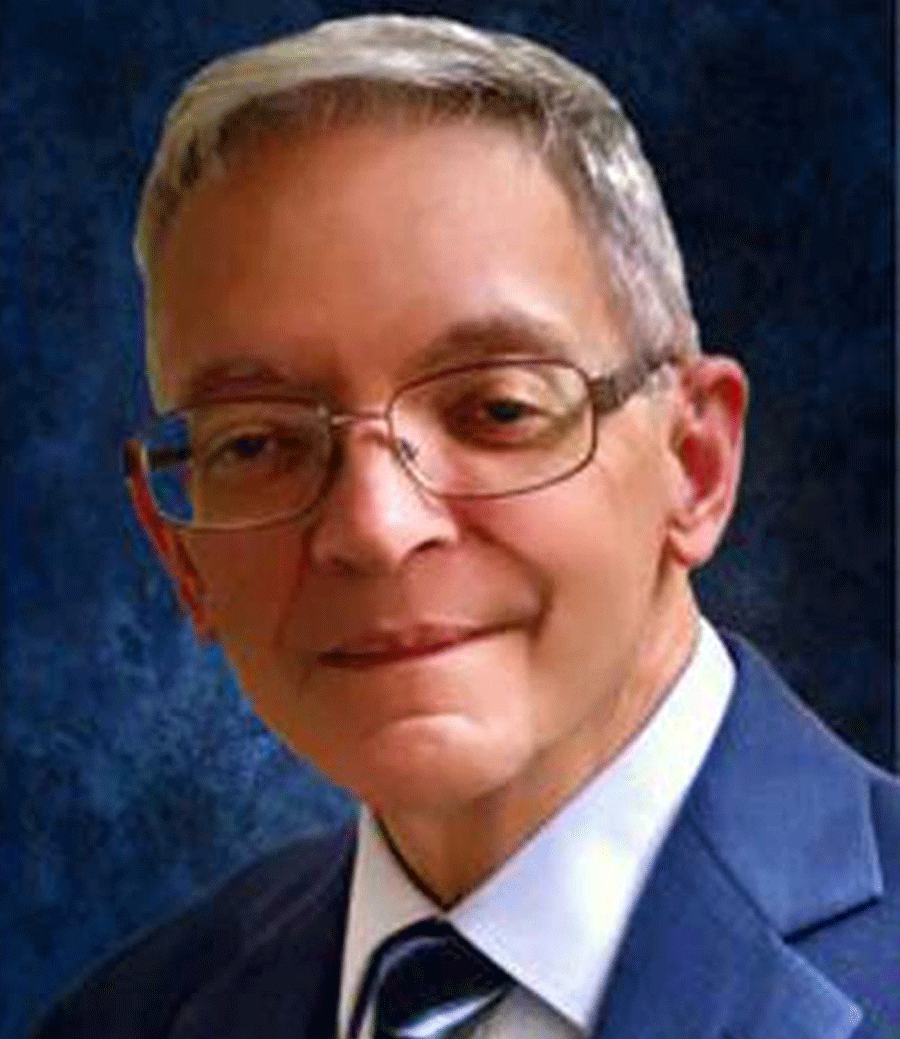 Rev David Hernquist We are deeply saddened by the passing of Pastor David Hernquist, our dear friend and Ministry Colleague here at Intercessory Prayer Ministry International (PMI). He passed away on December 16 after battling pancreatic cancer. Pastor Hernquist was an ordained minister of the Assemblies of God denomination and served as the Senior Pastor of Van Nest Assembly of God Church in the Bronx for over 33 years. During his tenure, the church flourished into a multicultural, multi-generational evangelistic community with five services every Sunday and various ministry programs and activities throughout the week. In addition to serving as a Pastor, he also held different leadership positions in the denomination, including as a Presbyter for many years.
Rev David Hernquist We are deeply saddened by the passing of Pastor David Hernquist, our dear friend and Ministry Colleague here at Intercessory Prayer Ministry International (PMI). He passed away on December 16 after battling pancreatic cancer. Pastor Hernquist was an ordained minister of the Assemblies of God denomination and served as the Senior Pastor of Van Nest Assembly of God Church in the Bronx for over 33 years. During his tenure, the church flourished into a multicultural, multi-generational evangelistic community with five services every Sunday and various ministry programs and activities throughout the week. In addition to serving as a Pastor, he also held different leadership positions in the denomination, including as a Presbyter for many years.
Pastor Hernquist was a veteran of the global prayer movement for several decades. He had a heart and a passion for the revival, healing, and transformation of nations, starting right here in New York City. Consequently, he was actively involved in various NYC prayer and evangelistic initiatives, such as March for Jesus, Bronx National Day of Prayer, Bronx Clergy Task Force, the Billy Graham Crusade, and the Annual Pastors Prayer Summit hosted by Concerts of Prayer Greater New York. He served as a board member of the organization for many years.
Since joining IPMI as an Advisory Board member in 2008, Pastor Hernquist has served the organization faithfully and exceptionally well at various times as an advisor, Conference Speaker, Planning Committee Chairman of the Annual Pastors and Leaders Prayer Symposium, and Facilitator of the First Friday Monthly Global Prayer Call (MGPT).
Those of us who knew Pastor Hernquist very well and benefited from his enormous love, wealth of experience, wisdom, profound humility, and exemplary prayer life demonstrated through his passionate prayer for the nations all shared our grief at the news of his passing. Pastor Hernquist has made an indelible mark on our lives here at IPMI and will long be remembered.
As we honor the life of this great servant leader at IPMI, let us cherish the remarkable legacy he has left behind, a legacy that was built and nurtured through prayer.
Merry Christmas and Happy New Year
On behalf of the entire leadership team at IPMI, I would like to express our sincere gratitude for your invaluable support. We wish you and your loved ones a joyful, Christ-filled Christmas and a happy, healthy, and prosperous 2024.
Rev. Newton Gabbidon
President & CEO


